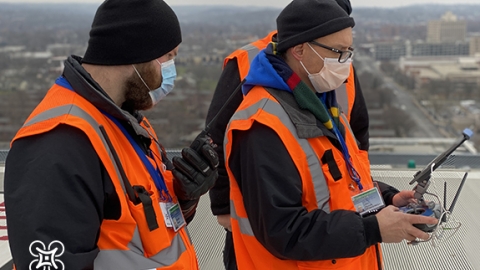It’s time to launch your organization’s drone flight program. You have selected your drone platform, identified your business case, highlighted your expected return on investment, built your program guidelines, selected a flight crew, and now you need the most crucial part–training.
Here is our recommendation.
Getting Started with Your Organization’s Drone Training – Melanie Harris
Getting certified to fly a drone legally requires study, passing the FAA’s knowledge-based 60 question test with a 70%+ score, a background check, and you are good to go. Or are you?
The FAA does not require you to pass a flight test to demonstrate your flying drones’ proficiency just yet. However, practical drone pilot training, otherwise known as drone flight and ground school, is necessary. Imagine flying a drone on an active construction site, inspecting cell towers, or doing a façade inspection of a high rise building with no hands-on training. This is likened to handing over your car keys to your teenager who passed the written test but never drove the car. We all need professional hands-on training to become proficient drone pilots.
So how do you get started? There is a tremendous amount of aviation material to study in preparation for the test. From understanding weather and reading METARs (METerological Aerodome Reports) and TAFs (Terminal Aerodome Forecasts) to understanding Sectional Aeronautical Charts, and determining the legalities of flying under FAA Part 107 regulations, and more. To prepare for the FAA Part 107 Knowledge Test, start with a free test prep course to practice taking the test. We also offer an extensive online training class from DroneUp’s online training partner Drone Pilot Ground School, known for lifetime access to your testing materials. Learning about these necessary and required tools from an expert is essential, and an online class is the best way to prepare for this test and study at your own pace.

Every individual and organization should invest in building proficiency. In-person, drone pilot flight and ground school adapt the concepts taught to prepare for your Part 107 Knowledge Test and apply them to real-world practice mitigating risk for safe flight operations. Expert drone flight instructors teach basic to advanced flight maneuvers and emergency procedures, building the right foundation for your drone pilot program from the start.
Flying a drone is a perishable skill. One of the most critical elements of building a pilot’s flight proficiency is often overlooked. Practice. Your organization will need a practice regimen ranging from executing routine practice drills to preparing for emergencies.
Validating and tracking drone pilot proficiency is mandatory for your program and provides performance indicators and certification updates. Insurance companies are starting to incentivize drone pilots by evaluating their flight data to test flight safety during operations.
DroneUp’s instructors trained the drone flight team and flew COVID-19 test kit delivery missions at The State University of New York’s (SUNY) Upstate University Hospital. Each flight crew member had to go through rigorous training that ended with a check ride. The “check ride” is a practical training component that constitutes a final exam for your flight crew. DroneUp also taught the requirements for flying drones over people. The more complicated operations, including flying drones over people, require waivers and additional training.
While training is essential to building your drone pilot program, knowing how to create standard operating procedures unique to your organization is paramount. These procedures should be updated as technology and regulations change and for process improvement for increased efficiencies and safety. Once you have these procedures in place, develop operation-specific training that includes a knowledge-based component, field flight operations, and check rides to validate.
So you see, training is more than taking a test. It’s learning vocabulary, understanding FAA regulations, running practical flight maneuvers, building a program with policy and documents, and more. It’s a commitment that realizes accountability, safety, and ultimately a return on investment for your organization,
Learn more about DroneUp’s Training & Program Development here, or for more information about our flight services and products, contact us here.
